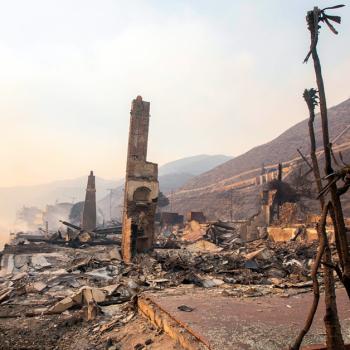Editors' Note: This article is part of the Patheos Public Square on Remembering the Dead: Ancestors, Rituals, Relics. Read other perspectives here.
Memorial services offer an opportunity to celebrate a life and reflect on how our own lives were touched by the person who died. They can facilitate grieving. An Ethical Culture Leader or other trained officiant can be helpful in planning and/or presiding at a funeral or memorial service. Funerals usually take place soon after death. Memorial services may be held at any time. A Humanist officiant's comments will reflect the Humanist values of caring, cooperation, and the uniqueness of each individual.
Whenever possible, family and friends meet with the officiant beforehand to discuss the nature and structure of the service, including suggestions for readings and music. At the service, the officiant may deliver the eulogy or others present may do so. Memorial Services may be held any time after a person dies. There is no legal necessity to have a licensed or certified officiant preside at a memorial service. Because death usually comes with great emotions, it can be especially helpful to have someone with experience in officiating at memorial services to assist in coordinating a service.
If it is known that someone is dying, it is possible to have a living memorial service so that the dying person can hear how much he or she has meant to the people whose lives were touched. Such a service can be a joyous celebration of life.
A memorial service is a ceremony that makes us stop and pay attention to a change in our lives. I like the way Alan Wolfelt, Director of the Center for Loss and Life Transition, sums up the purposes of a memorial service in his book Creating Meaningful Funeral Ceremonies: A Guide for Caregivers. (As a rule, funeral services have the body of the person who died present, while memorial services do not. Yet they serve many of the same purposes.) Dr. Wolfelt's purposes for a memorial service, which correlate well with humanist values, include "six reconciliation needs of mourning":
- Acknowledge the reality of the death.
- Move toward the pain of the loss.
- Remember the person who died.
- Develop a new self-identity.
- Search for meaning.
- Receive ongoing support from others.
Humanists base their lives in reality. Acknowledging the reality of death, the pain of no longer having someone who was special in your life, searching for meaning, and finding ways to have ongoing support in our lives are especially important for Humanists. Because our beliefs are such that we do not expect to ever again have any direct interaction with the person who died, and because we do not have an instruction book or prescribed practices for what to do when someone dies, we need to figure out how we will accept the death of someone close to us. We need to ask ourselves what will we do to honor the person who died, who are we without this person in our lives, and, sometimes, the very real question of how will we keep on living.
Many humanists focus on human relationships. Once a person is dead, we need to form a new relationship with him or her, who, though gone, is still part of your life. When I was about to have a certification ceremony as an Ethical Culture Leader, my mom had already been dead for ten years. I felt very sad that she would never know that I became an Ethical Culture Leader some forty years after she first took me to Sunday School in Brooklyn. A friend, who meant to be comforting, said he was sure that somehow my mother knew. I said I didn't believe that and she wouldn't have believed it either. What I did instead was to write letters to my mother, to think about my mother and to think about what she might have said to me if she were there, how proud and pleased she would have been. That practice allowed me to be more fully present on the day of the ceremony rather than having my attention drawn away by sad thoughts about my mother. I had created a new identity for myself, not only as a Leader, but as a person with a dead mother who would have been very proud of her.
Sometimes the remembrance isn't done collectively or formally, as at a memorial service. Sometimes people, for a variety of reasons, choose not to have a memorial service. If I happen to learn of such a preference, I try to have a conversation about why they don't want a service, explaining that memorial services are not for the deceased. If there is no memorial service for someone who was important in your life, or you are not able to attend a service, you might want to find other ways to be intentional in acknowledging the death.
The idea of planning our own memorial service or writing our own obituary might seem very strange, macabre, or even have a sense of grandiosity. Yet this practice can serve several purposes. Thinking about our own death can enhance how we think about our life. Thinking about what we hope might be said at the time of our death can provide motivation to live as well as we can, to live as closely in accordance with our values as possible. Planning our own memorial can also give guidance to those responsible for creating a memorial service.




